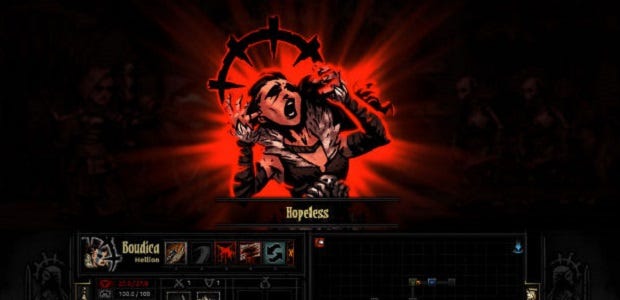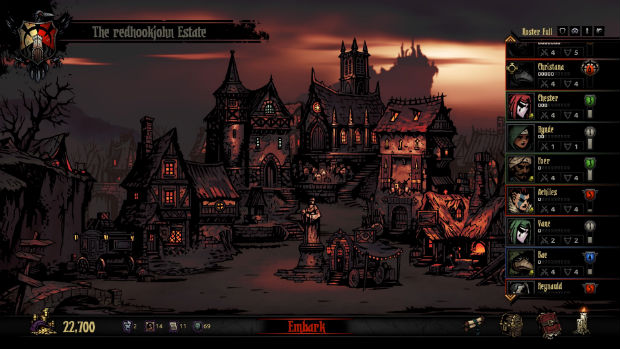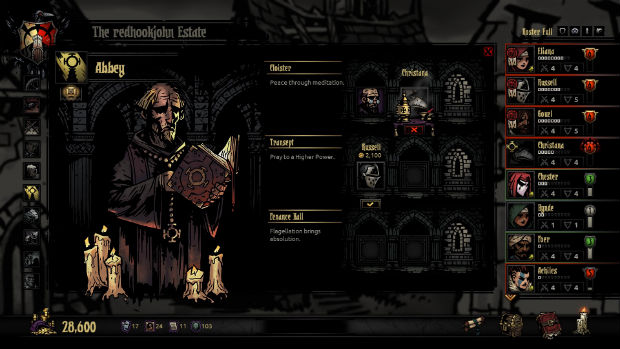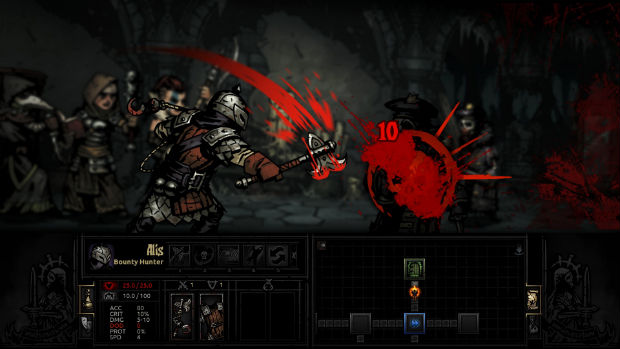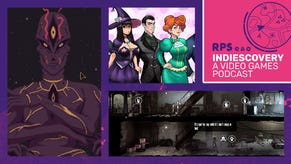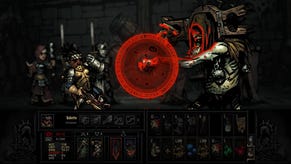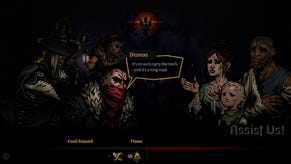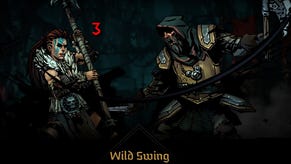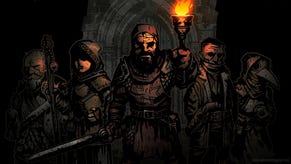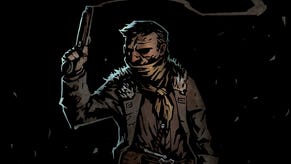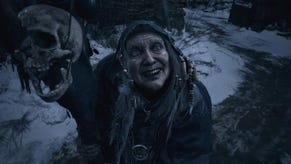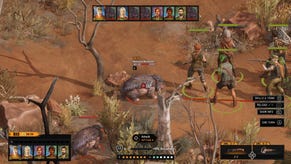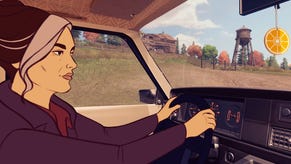Wot I Think: Darkest Dungeon
Way down in the hole
Darkest Dungeon [official site] begins with a foreboding admonition. It’s a game about making the most of a bad situation, you’re told from the outset. Your actions are permanent, therefore the quests you embark upon will often end in failure. “Heroes will die,” it says. “And when they die they stay dead.”
These preeminent words of wisdom project an honest sentiment that’s not only a tone-setter for Darkest Dungeon, but also serves to define its makeup: through each stage of development - from its beginnings, its crowdfunding success, a year-long stint in Early Access, and now onto full release - developer Red Hook Studios envisioned a brutally difficult game that would offer little in the way of concession. But does the game make death and despair engaging? Here's wot I think.
Darkest Dungeon is the realisation of its theme and cruel twist on dungeon-crawling. Its prudent candor is what stands it apart from the hordes of commensurate permadeath-operating, procedurally-generating roguelikes available elsewhere. It’s a game that can be stubborn, incredibly frustrating, at times baffling, and often wonderful. It’s as much about micromanagement, resource gathering and squad building as it is about luck, perseverance and determination, where the line between hope and despair is often as hard to determine as guessing which mindset your haphazard crew will grudgingly drag onto the battlefield.
Unlike its genre siblings, though, it’s far from a whimsical fairy tale depicting valiant warriors and fervent champions, but the complete opposite. Worse still, it wastes no time reminding you of this at every turn.
A patriarch attuned to a lifestyle of opulence and excess has excavated the caverns that wallow beneath his family’s sprawling estate. Rumours once pointed to a sacred underground tomb housing untold wealth, thus, driven by greed, he’s spent his entire family fortune - your family’s fortune, it turns out - in a selfish pursuit to grab what he can. Instead, the gates of the underworld have been inadvertently thrust open and its ghastly inhabitants have overtaken this particular corner of the overworld.
A pop-up hamlet-turned-bustling economy of parishes and brothels, blacksmiths and taverns has assumed residency on the estate and now it’s on you to reclaim your recently deceased ancestor’s manor. Well, not you, but a line of keen but self-effacing rogues-for-hire who very quickly realise they’re in over their heads. From here, you’ll gather four soldiers from the village Stagecoach - a conveyor belt of replenishing employment - to lead into battle. From hereon, you’ll test their patience, mettle and wellbeing; not to mention your own.
Of the 14 hero classes eventually available for draft, each inclusive combatant performs better - or at least has the predilection to do so - in the settings and circumstances levied by each of the game’s four unique battlegrounds and fifth titular darkest dungeon. As such, experimentation is encouraged at the expense of a solid ‘best four’, as it were. Vestals, for example, fight best against the undead monstrosities that lurk within The Ruins, yet offer little in the way of melee strength. Often, the mindless brute force of a Bounty Hunter will dig you out of a hole - and prevent your team from being sent to one - but the hard-shelled and shielded beasts that reside in The Cove suffer most at the hand of your Plague Doctors, masters of the status effect.
Managing all this in practice is more complicated than it might sound. Combat is meticulous to the point where fortunes can flip in the blink of an eye. When it does, you’ll feel instantly hard done by. You might take an enemy down to its last breath before it unleashes a ranged, sweeping critical hit that destroys your party in one fell swoop. You’ll curse, and, while you’ll struggle to admit it, you’ll know you’ve messed up somewhere along the chain that’s led you down this fatal dead end.
Positioning, within the party and among enemies, is vital as attacks can only strike specific sections of the enemy formation. Perhaps you utilised your jester’s last ditch, hail mary-style attack that inadvertently bumped him to the front of your formation, knocking your crusader into third place. In this spot the latter is useless, thus you wasted a turn nudging him forward again. In the meantime, that burly Brigand Bloodletter has made light work of Marisco the jester, now stranded out in front, and, too busy focused on pushing your crusader forward, your grave robber in second has all but bled out. Add this to the fact that felled enemy corpses don’t instantly vanish, instead forming obstacles to fight around - sometimes blocking you from attacking idle enemies - and suddenly what looks like straightforward turn-based fare very quickly becomes a surfeit of knife-edged decisions that can quickly serve to overwhelm.
Add this to the fact that battles are randomised in classic JRPG-style, foes get decidedly tougher when the darkness gauge that tops the screen expires - and you’ve inevitably run out of torches - and that mysterious sub-bosses appear from nowhere even after you’ve supposedly vanquishing an area and, well, my head’s beginning to spin simply by recounting it all.
Success is then hinged upon how you best mix and match your foursomes, yet even a well-trained, well-equipped, well-provisioned team can be struck down in an instant. “And when they die they stay dead”, the narrator’s prophetic verse marks an unforgiving reminder that you’ll become intimately, and infinitely, acquainted with. Even a seasoned squad - one which has survived perhaps four or five or six dungeon runs - can, and will, succumb to Darkest Dungeon’s most lethal enemy: stress.
Enemy attacks cause stress. Watching a comrade suffer a blow causes stress. Darkness causes stress. Too much light causes stress. Hunger causes stress. Bleeding causes stress. As is consistent with reality: just about anything causes stress. While a full stress bar can have positive effects, afflictions will more often force maladies upon your squads such as paranoia, masochism and antagonism, among many others. Perhaps the afflicted will mock teammates for their lack of valor in battle, which in turn causes the recipient’s stress to rise. Maybe they’ll retreat in action for fear of a teammate’s betrayal. Or maybe they’ll flat out refuse to cooperate, even when offered food or remedies should they wind up on death’s door. If any given fighter’s stress bar fills a second time, they’ll suffer a heart attack on the spot.
“And when they die they stay dead.”
So to avoid untimely deaths, de-stressing your mercenaries by way of the hamlet’s services becomes not only a necessity but also part of the game’s grand strategy. I sent one of my earliest recruits - Dismas, a Highwayman who I’d become particularly fond of early on for, well, not dying immediately - to recover from one notably arduous dungeon run in the town’s tavern. Booze, I thought, that works for me - it’ll surely work for him. In the meantime, I took on some new blood, went about training her up, and completely forgot about ol’ Dismas as he searched for restitution at the bottom of the bottle.
Weeks passed, comrades came and went, and by the time I realised I’d misplaced my one-time stalwart, I had a paranoid alcoholic on my hands who refused to turn up to work unless heavily inebriated. Through some warped sense of loyalty, I drafted him into the next expedition - a trek into the aforementioned Coves - where he died a slow and grueling death. Maybe I should’ve sent him to the brothel to relieve himself, or to seek penance at the abbey instead? I felt bad, but at the same time a sense of relief.
You see, starting afresh in Darkest Dungeon is a pain - grinding for hours to stretch beyond mere apprentice level is an undoubted slog - yet housing and maintaining a veteran team who either can’t stand one another or themselves proves an equally testing challenge in its own right. What’s refreshing about the whole system of recovery, though - on a tertiary level, over and above strategy and management - is that it reflects the horrors your team put themselves through for your sake, and that their undertakings have indeed taken their toll on their wellbeing and performance.
Handling issues of mental health in videogames can be a controversial topic, but Darkest Dungeon comes at it from an angle of pragmatism: if this were reality, these things really could have psychological effects on those involved. That is to say: how often do our videogame heroes engage in mass murder without batting an eye, for example. Building systems and structures around your characters’ states of wellbeing is a natural extension of the roguelike genre and works well in this instance. Furthermore, afflictions can be cured via time spent in the Sanitorium; weapons can be customised by the Blacksmith; skills can be upgraded at the Survivalist; and unique abilities can be enhanced at the Guild as your characters progress.
Upgrading the Stagecoach perhaps becomes the most important feature of the game, particularly when the chips are down. The game’s multitude of systems can at times feel overwhelming - especially when your team sheet is full, your old guard is preoccupied at the pub, and your new starts are too green to get their hands dirty. A high turnover is what you need to face the grind and that is only possible with a fancier wagon. The jump from apprentice level to veteran is a big one, thus it makes sense to have more than four warriors fighting at top rank.
It’s at this stage I feel Darkest Dungeon might lose people, though. The precarious balance of fair/unfair the game so elegantly maintains up to this point seems to become distinctly skewed in the game’s favour, and for a longer period of time than seems necessary. It’s hard enough to make it to this stage at all, yet the final push into the latter stages of the game - and onto the eponymous Darkest Dungeon - requires an inordinate amount of grind, grit and determination. It’s worth sticking it out, but it ain’t for the faint of heart.
Then again, that’s exactly what Red Hook Studios set out to do. In Darkest Dungeon you’ll engage in more dungeon runs than you’ll care to admit. You’ll slouch around its underground recesses while steadfastly clutching a sliver of health or a shard of sanity. You’ll wonder at its pitch-perfect art style, and cringe at its relentlessly pessimistic, but entirely correct, narrator.
You’ll lose lives, money, resolve and the marbles of your crew, before you’re back at the hamlet with nothing to show, no further forward, another four bodies resigned to the graveyard. You’ll incessantly tour a ragtag mob of reluctant rookies into foregone conclusions. You’ll laugh at the fact you’ve wound up with a nymphomaniac alcoholic who is barred from both the Tavern and the Brothel. You’ll cry. And cry and cry and cry. But I think you’ll love it.
“Heroes will die,” reads the preeminent understatement at the game’s start. “And when they die they stay dead.”
Darkest Dungeon is out now.
